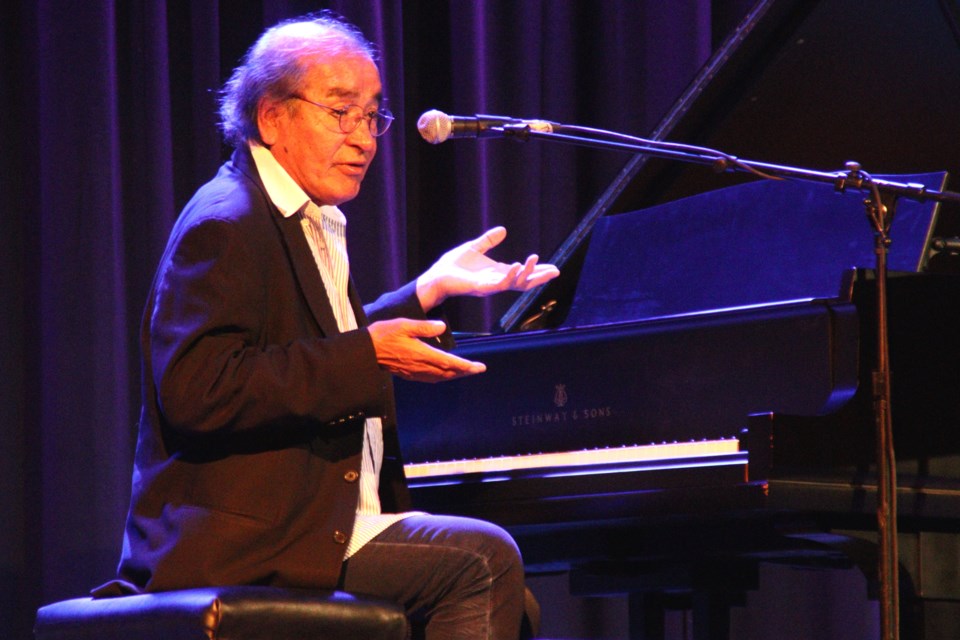It’s hard to sum up Tomson Highway in a small number of words. The northern-born Renaissance man had a full crowd enthralled during his appearance at the R.H. Channing Auditorium Oct. 14, covering a wide array of subjects and experiences.
In conversation with the audience, Highway, a playwright, author, concert pianist, composer and speaker, focused at length on language, history and culture. That included using those fronts both as tools for communication and as ways to have fun, saying that languages and customs have their own inherent traits that get passed down - sneaking in a few light-hearted jokes at the expense of the mooniyas (“white people”, in Cree parlance) to the delight of a packed crowd.
“Cree, my native tongue, is the fastest language in the world - especially the dialect that I speak, which is from northern Manitoba, from Saskatchewan, Nunavut and the Northwest Territories. It’s the fastest Cree dialect of all the Cree dialects in Canada, of which there’s about a hundred,” he said.
“I have a tendency to get overly excited when I’m in a room full of people I love and I start to talk really fast. Lip readers, mooniyas lip readers who try to study the Cree language, they sometimes go blind,” said Highway, to a roar from the audience.
“If you catch me starting to talk too fast, all you have to do is raise your hand and go, ‘Stop - in the name of love,’” said the host to another roar.
Highway spoke of Cree and other Indigenous languages as having inherent qualities to them and vocabulary which impacted how stories in each language could be told.
One of the recurring characters in both Highway’s works and in Cree legend is the idea, by any name, of the trickster - a character who uses their cunning and smarts to defy convention, to occasionally play tricks on people and raise mischief, sometimes if only for the sake of the mischief itself. Highway even took on some traits of the trickster himself in his off-the-cuff, often irreverent but insightful stage presence and stories, hopping from topic to topic. Part lecture, part stand-up routine, part frank conversation and all performance, Highway used wisecracks and both historical and anecdotal knowledge to illustrate his points, later using the same tools to touch on theology, gender, sexuality, nature and many other subjects.
Highway spoke of the history of northern Indigenous languages and culture, particularly the ones he was surrounded by growing up with a nomadic family in the far north. Highway’s father Joe was originally from Pelican Narrows - from which a large group of attendees came for the night - but Tomson grew up around the speakers of Cree, Dene and Inuktikut, each language with their own unique roots and structures, each barely related to each other if at all.
“My parents never went to school for a single day. They had grade zero. I know that because we went to the grade zero graduation ceremony - there was not much happening,” he said.
“They spoke four languages. My father, Joe Highway, spoke four languages.”
Highway performed on the community hall’s Steinway piano, playing a solo samba piece inspired by his time in Brazil. Highway mentioned the art of Brazil as a place where great art came from trauma - samba, for example, first came to Brazil by enslaved Africans and their descendents, taken to the country by force. Highway also mentioned a theory on personal pain and trauma and how beauty can come from it.
“I’ve come to believe, over the years, that trauma tends to operate on the same principle as manure. The more disgusting it is, the more it stinks, the more spectacular the vegetation you will get,” said the host.
Highway was later joined by singer Kim Jones, who sang along to Highway’s piano work to conclude the evening - both got a standing ovation from the assembled crowd once the show was over.
The Flin Flon Community Choir opened up the show with a performance of Kisakhitin (I Love You), a song originally written by Rhonda Head, a critically acclaimed singer and songwriter from Opaskwayak Cree Nation who has worked with the choir in the past. Courtney Lycan sang the soloist part of the performance, accompanied by Mark Kolt on piano and Angela Ishaka leading the choir for the first time as the choir’s new director.
Apart from the talk and the tunes, Highway took questions from the audience and spoke with them on and off stage, signing copies of his works and even sitting with the crowd in the R.H. Channing Auditorium’s seating for a chat.




